A bayou is a slow-moving stream or a wetland.
Contents
Bayou may also refer to:
A bayou is a slow-moving stream or a wetland.
Bayou may also refer to:

Creedence Clearwater Revival, also abbreviated as CCR, was an American rock band formed in El Cerrito, California. The band initially consisted of lead vocalist, lead guitarist, and primary songwriter John Fogerty; his brother, rhythm guitarist Tom Fogerty; bassist Stu Cook; and drummer Doug Clifford. These members had played together since 1959, first as the Blue Velvets and later as the Golliwogs, before settling on Creedence Clearwater Revival in 1967.

Creedence Clearwater Revival is the debut studio album by American rock band Creedence Clearwater Revival, released on July 15, 1968, by Fantasy in the US. Featuring the band's first hit single, "Susie Q", which reached number 11 in the US charts, it was recorded shortly after the band changed its name from the Golliwogs and began developing a signature swamp rock sound.
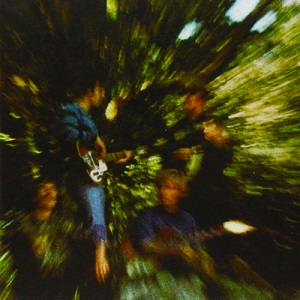
Bayou Country is the second studio album by American rock band Creedence Clearwater Revival, released by Fantasy Records in January 1969, and was the first of three albums CCR released in that year. Bayou Country reached number 7 on Billboard's album chart and produced the band's first No. 2 hit single, "Proud Mary".
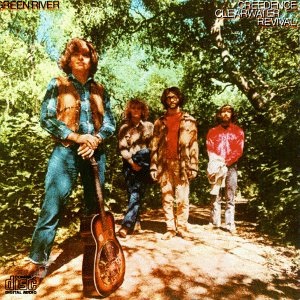
Green River is the third studio album by American rock and roll band Creedence Clearwater Revival, released in August 1969. It was the second of three albums they released in that year, preceded by Bayou Country in January and followed by Willy and the Poor Boys in November.
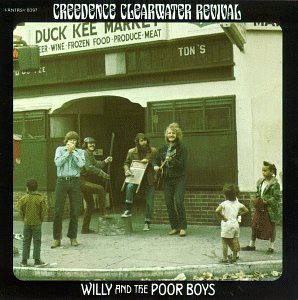
Willy and the Poor Boys is the fourth studio album by American rock band Creedence Clearwater Revival, released by Fantasy Records in November 1969. It was the last of three studio albums the band released that year, arriving just three months after Green River.
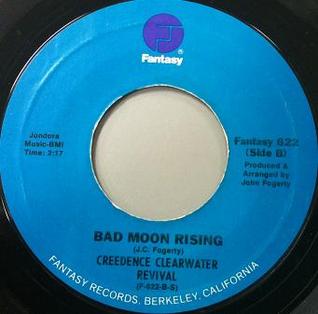
"Bad Moon Rising" is a song written by John Fogerty and performed by Creedence Clearwater Revival. It was the lead single from their album Green River and was released in April 16, 1969 four months before the album. The song peaked at No. 2 on the Billboard Hot 100 chart on 28 June 1969 and reached No. 1 on the UK Singles Chart for three weeks in September of that year. It was CCR's second gold single.
"Born on the Bayou" (1969) is the first track on Creedence Clearwater Revival's second album, Bayou Country, released in 1969. It was released as the B-side of the single "Proud Mary" that reached No. 2 on the Billboard charts. The song was covered by Little Richard.
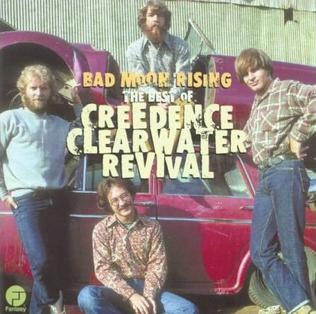
Bad Moon Rising: The Best of Creedence Clearwater Revival is a compilation album of the major hits from American rock band Creedence Clearwater Revival. It was released in 2003.

"Proud Mary" is a song by American rock band Creedence Clearwater Revival written by John Fogerty. It was released as a single in January 1969 by Fantasy Records and on the band's second studio album, Bayou Country. The song became a major hit in the United States, peaking at No. 2 on the Billboard Hot 100 in March 1969, the first of five singles to peak at No. 2 for the group.

The Concert is the second live album by American rock band Creedence Clearwater Revival, released by Fantasy Records in October 1980. It was recorded at the Oakland–Alameda County Coliseum Arena in Oakland, California, on January 31, 1970.

"Have You Ever Seen the Rain?" is a song written by John Fogerty and released as a single in 1971 from the album Pendulum (1970) by American rock band Creedence Clearwater Revival. The song charted highest in Canada, reaching number 1 on the RPM 100 national singles chart in March 1971. In the U.S., in the same year it peaked at number 8 on the Billboard Hot 100 singles chart. On Cash Box pop chart, it peaked at number 3. In the UK, it reached number 36. It was the group's eighth gold-selling single. In March 2023, the song surpassed one billion streams on Spotify.
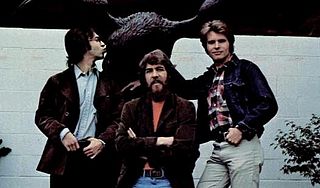
The discography of American rock band Creedence Clearwater Revival, who released their first album and singles in July 1968, includes 7 studio albums, 3 live albums, 41 compilation albums, and 29 singles. The group, although only active for 4 years, has sold more than 30 million albums and singles in the United States alone, and has charted in multiple countries throughout the world.
Creedence Country is a compilation album by American rock band Creedence Clearwater Revival (CCR). It was released by Fantasy Records in October 1981 with the purpose of infiltrating the country market.

"Green River" is a song by American rock band Creedence Clearwater Revival. It was written by John Fogerty and released as a single in July 1969, one month before the album of the same name was released. "Green River" peaked at number two for one week, behind "Sugar, Sugar" by The Archies, and was ranked by Billboard as the No. 31 song of 1969.
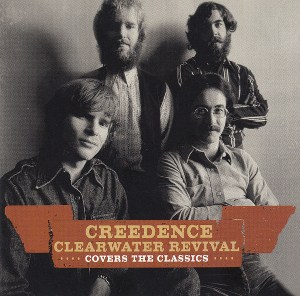
Creedence Clearwater Revival Covers the Classics is a compilation album by American rock band Creedence Clearwater Revival. Released in 2009, the album contains cover versions of songs as recorded by the band.
"Deja Vu (All Over Again)" is a song by American rock singer/songwriter John Fogerty. It is the title track, opening track and lead single to his 2004 eponymous album. The song reached #4 on the Billboard Adult Alternative chart.

Live at Woodstock is a live album released on August 2, 2019 via Fantasy Records. The set documents swamp rock band Creedence Clearwater Revival's set at the Woodstock music festival on August 17, 1969. The release has received positive reviews and mild chart success.
"Keep On Chooglin'" is a song written by John Fogerty that was first released as the final song on Creedence Clearwater Revival's 1969 album Bayou Country. The song was often used to close Creedence Clearwater Revival concerts and was later covered by several other artists including Fogerty as a solo artist. The song popularized the neologism "chooglin'."
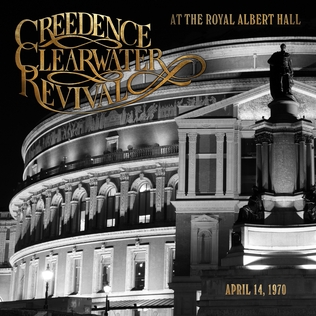
At the Royal Albert Hall is a 2022 live album recorded in 1970 with American swamp rock band Creedence Clearwater Revival. The performance was released as an album to coincide with the documentary film Travelin’ Band: Creedence Clearwater Revival at the Royal Albert Hall, directed by Bob Smeaton. The recordings document the band's first European tour and feature footage that has never been released; the album includes the entire set recorded on April 14, 1970.